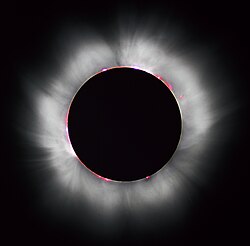This article needs attention from an expert in Physics. The specific problem is: The nature of the effect is not described. (June 2022) |


The Allais effect is the alleged anomalous behavior of pendulums or gravimeters which is sometimes purportedly observed during a solar eclipse. The effect was first reported as an anomalous precession of the plane of oscillation of a Foucault pendulum during the solar eclipse of June 30, 1954 by Maurice Allais, a French polymath who later won the Nobel Prize in Economics.[1] Allais reported another observation of the effect during the solar eclipse of October 2, 1959 using the paraconical pendulum he invented.[2][3] This study earned him the 1959 Galabert Prize of the French Astronautical Society and made him a laureate of the U.S. Gravity Research Foundation for his 1959 memoir on gravity.[4] The veracity of the Allais effect remains controversial among the scientific community, as its testing has frequently met with inconsistent or ambiguous results over more than five decades of observation.
- ^ Hecht, Laurence (24 October 2010). "In Appreciation of Maurice Allais (1911-2010) The New Physical Field of Maurice Allais" (PDF). 21st Century Science & Technology. pp. 26–30.
- ^ Allais, M. (September 1959). "Should the Laws of Gravitation Be reconsidered? Part I – Abnormalities in the Motion of a Paraconical Pendulum on an Anisotropic Support" (PDF). Aero/Space Engineering: 46–52. Archived from the original (PDF) on 2015-07-20.
- ^ Allais, M. (October 1959). "Should the Laws of Gravitation Be reconsidered? Part II – Experiments in Connection with the Abnormalities Noted in the Motion of the Paraconical Pendulum With an Anisotropic Support" (PDF). Aero/Space Engineering: 51–55. Archived from the original (PDF) on 2016-06-22.
- ^ Allais, Maurice (1959). New theoretical and experimental research work on gravity. Memoir (Report).